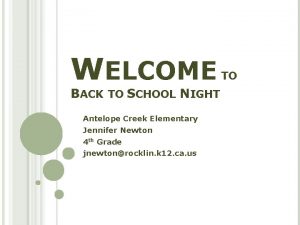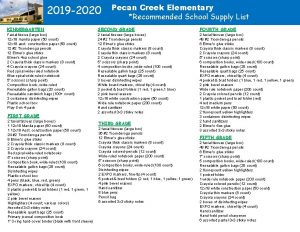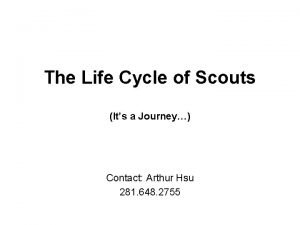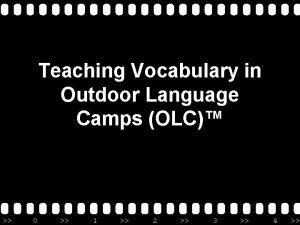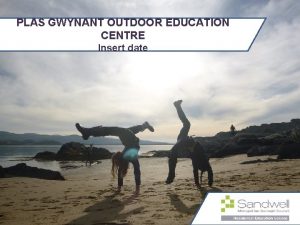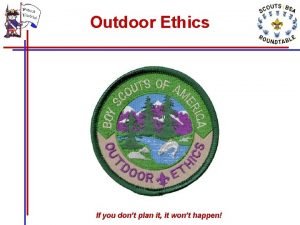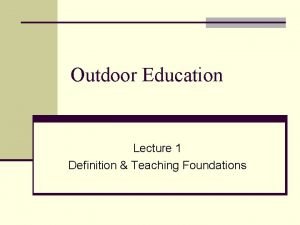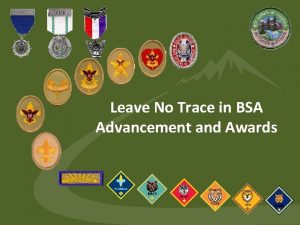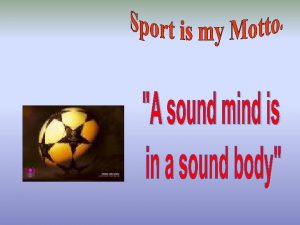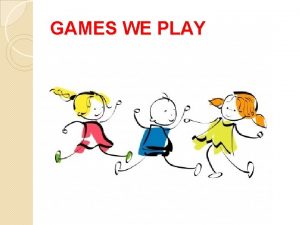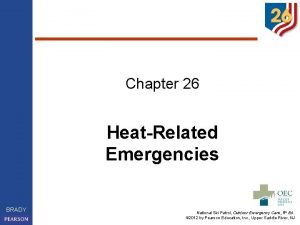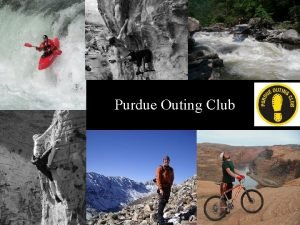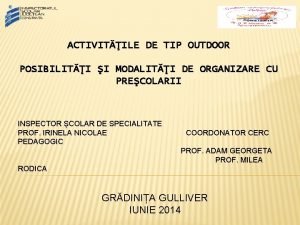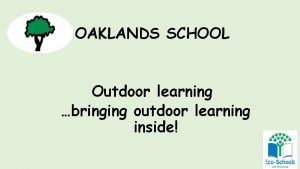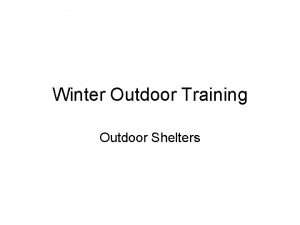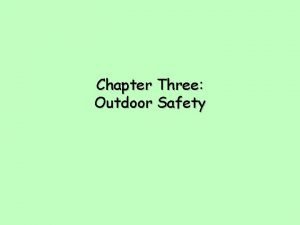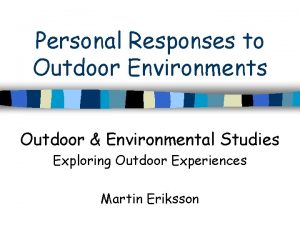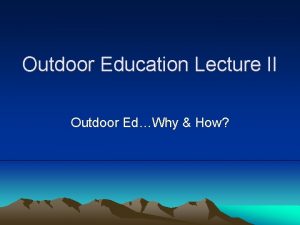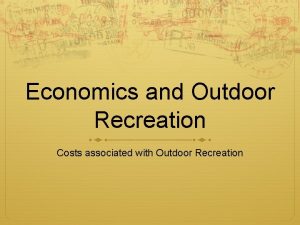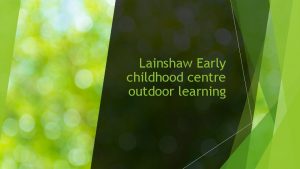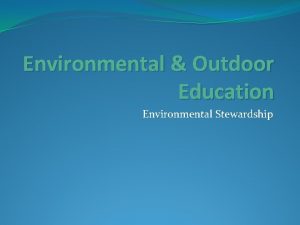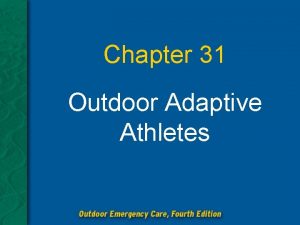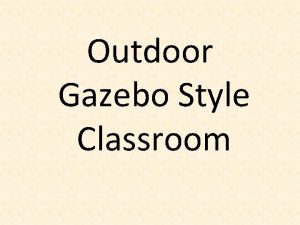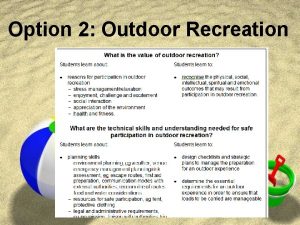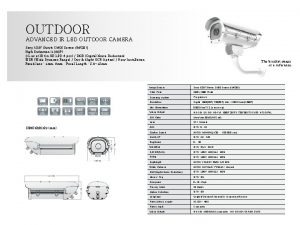Outdoor School Trickle Creek Trickle Creek Outdoor School











































- Slides: 43

Outdoor School – Trickle Creek

� � Trickle Creek Outdoor School occurs at the camp of the Oregon 4 -H Center. This site is located 8 miles northwest of downtown Salem, and is about an 80 minute drive from downtown Portland. Trickle Creek offers over 300 acres of beautiful natural study areas, including forests, ponds, meadows, fields and streams. There is abundant wildlife at Trickle Creek, especially the deer that are often seen wandering near the middle of camp. Many of Trickle Creek's buildings and pathways feature a wide variety of beautiful, hand -cut and polished native rocks that were collected by the late Ivan Stewart, the original owner of the property that is now the camp. The dining hall includes a floor-to-ceiling fireplace made from native petrified wood. There are eight cabins on site, as well as two modern bathhouses, a magnificent campfire area, nice staff & teacher accommodations, and open-air shelters.

� TO THE STUDENT � This OUTDOOR SCHOOL STUDENT GUIDEBOOK has been written for you, the student. Soon you and your classmates will be leaving your classroom to attend Outdoor School. You will spend a week living and learning in a whole new setting. It will be a very special and unique experience. � To learn as much as possible and to have as much fun as possible, you will want to be well prepared before you arrive. This Guidebook describes some of the things you will do at Outdoor School and provides suggestions for things you may want to bring with you. Share this book with your parents. They will be interested in what you will be doing while you are away.

� The main reason you are going to Outdoor School is to learn about the natural world and about the responsibility people have for caring for the natural environment. As you explore the streams and forests and make discoveries around each bend in the trail, you will find that learning is fun and exciting in the out-of-doors. You will also discover the out-of-doors is a beautiful and inspirational place to be. � Another part of Outdoor School is the chance for you, your classmates and new friends from other classes to live together and enjoy activities such as outdoor recreation and evening campfire programs. � Everyone at Outdoor School has been very busy preparing for your arrival. We are all looking forward to your week with us!

� THE OUTDOOR SCHOOL SITE � Your Outdoor School site is a one to two hour ride from your school. As the bus passes through the gate and bounces down the road to the camp, you will discover that it doesn’t look like any school you have been to before. There is a large dining hall where everyone has their meals and where your class can meet if it pours down rain. There are cabins for you to sleep in. There also bathrooms and showers. All of the buildings have electricity. � Since the Outdoor School program is designed to let you learn about the out-of-doors, you will be able to step outside your cabin door and find yourself surrounded by your classroom. Forests and meadows stretch off in all directions and a stream may flow right by your cabin. You can fall asleep listening to the water rushing over the rocks!

�Trails through the woods provide ways to explore the farthest corners of the site. Each morning and afternoon your class takes off in a different direction for field study activities. As you walk among the towering old fir trees, you can hear birds and squirrels chattering in the bushes. You may even see a deer bounding down the trail in front of you.

� � THE OUTDOOR SCHOOL STAFF When you step off the bus at Outdoor School you are greeted by a big group of people who have been very busy preparing for your arrival. The Site Supervisor is like an Outdoor School principal. He/she plans the activities with your classroom teacher to make sure that everything goes smoothly and that you have a fun and educational week. Field Instructors plan and teach field study activities. All of them are experts in the out-of-doors. If you have any questions about ecology or nature, these are the people to ask! Program staff members are in charge of all other parts of the program. These energetic people teach recreational activities, lead songs, plan meal-time programs and lead you in duties, helping keep the Outdoor School site clean. You will find them leading fun activities from very early morning until long after you are in bed at night.

� � � A Health Supervisor lives at Outdoor School twenty-four hours a day to take care of your medical needs. This person will dispense medications, provide first aid and makes sure everyone stays healthy. Your classroom teacher will also be at Outdoor School to help with the teaching and other activities. A kitchen staff works very hard preparing delicious, nutritious meals for you and a camp caretaker/manager makes sure the camp is in good repair. Each week a very special group of high school or college students volunteer a week of their time to be Outdoor School Counselors. They will be living in and supervising your cabins, and they will help teach field study activities. One of the special features of Outdoor School is the large number of adult staff and counselors. This means that many of the activities can be conducted in small groups. It isn’t often you get a chance to be in a class with one teacher and only 8 students.

� LEARNING AT OUTDOOR SCHOOL – FIELD STUDY � Outdoor School means school in the outdoors. Students spend the week learning about things that are best studied outdoors. What better way is there to learn about insects than to observe them in their homes or to study the chemistry of water while sitting on the bank of a pond? � Each morning and afternoon you, your classmates and teacher will explore a different part of the camp environment. Most of the work is done in small groups. In a small group it is very easy for everyone to see and hear everything and participate in all the activities. � Learning takes place in lots of different ways at Outdoor School, such as by exploring, experimenting and observing. You can use all of your senses to discover new things about the environment. Seeing, hearing, smelling and touching are all important ways to get new information about your surroundings.

� You also get the chance to apply your skills in reading, mathematics and writing. When learning in the out-of-doors, it is often important to take notes or draw pictures, which will help you remember your discoveries for discussion and sharing later. You will be given a “Field Study Journal” in which you can record your observations. � The main topics of study at Outdoor School are ecology, natural resources and people’s relationship to the environment. Each of the Outdoor School sites organizes the studies a little differently and may have some different activities, but everyone learns the same things.

� Areas of Study: � Energy Flows. Almost all living things get their energy from the sun. Green plants capture the sun’s energy in a process called photosynthesis. Animals get their energy by eating plants or by eating other animals that have eaten plants. � Matter Cycles. The materials that are important to living things, move back and forth between living plants and animals and the environment. Some of these materials are water, oxygen, carbon and minerals. � Interactions. Living things are constantly interacting with each other and with their surroundings. It is through these interactions that matter cycles around and energy flows through the environment. � Ecosystem. Plants and animals live in places that provide all the things they need to survive. All the plants and animals and the surrounding environment are called an ecosystem.

� Natural Resources. People use the environment for many things. The air we breathe, water we drink, homes we live in and food we eat all come from the environment. The things we use from the environment are called natural resources. In Oregon, important natural resources include forests, water, soil, air, wildlife and minerals. Many people have jobs that depend on natural resources. Some of these jobs include farming, logging, fishing and mining. People also enjoy natural resources for recreation. � Sometimes there are not enough natural resources to meet everyone’s needs and wants. Then people must decide how they will use these limited natural resources.

�Environmental Responsibility. In just a few years you will be adults and voting about important issues that affect the environment. Even now you can contribute to solutions for environmental problems. With a good knowledge of how the natural world works you can help make better decisions. At Outdoor School you will discover that environmental problems are not easy to solve. If they were, they wouldn’t be problems.

� HAVING FUN AT OUTDOOR SCHOOL � Each afternoon there is a recreation period. This is an opportunity for you to try some new outdoor activities that you might like to pursue as hobbies after Outdoor School. Instead of things like softball and soccer, the emphasis is on activities that make use of the outdoor setting. Predator/Prey games, hiking, outdoor skills such as fire building and use of a compass, and nature crafts are available. You can pick something active or if you prefer, you can select something that is quiet and more relaxing. � After dinner each day there is a special evening activity planned. It may be indoors or outside. Your cabin group may be working together as a team and it will be fun!

� CABIN LIVING GROUP � At Outdoor School there are students from three to five classes. You and a few of your classmates join with eight or ten students from the other classes to make up a cabin living group. Each group lives in a separate cabin under the leadership of one or two counselors. Many activities are done with your cabin group throughout the week. Many good friendships are formed with cabin mates. � There is time each day for you and your cabin partners and counselors to play games, visit and have fun. � Everyone is responsible for keeping the cabins neat and clean. There is time set aside each morning to accomplish this task. Cooperation with everyone in the cabin on clean-up and other activities makes for a successful cabin group.

� HINTS FOR CABIN CLEAN-UP � Bunks: Are the sleeping bags or blankets arranged neatly? � Gear: Is all the gear neatly arranged? Are suitcases closed and under the bunks? Is the arrangement orderly and consistent throughout the cabin? Are clothes hung up or put on shelves or in the suitcases? � Shoes: Are shoes arranged neatly and not in the middle of the floor? � Lights & Heaters: Have you conserved energy by turning off the lights and heater? Is your cabin door closed? � Floor: Is the floor clean? (Check around bed posts. ) � Grounds: Are there bits of paper and other litter outside your cabin or in the area?

� Everyone � MEALS at Outdoor School eats meals together in the large dining hall. The cooks prepare delicious, well-balanced meals. There are even homemade rolls! Two adults or counselors and eight students sit at each table. � Everyone is encouraged to try all the different kinds of food served. You may discover how good some new dishes can be. Second helpings are usually available and no one goes hungry. Everyone is encouraged to eat everything on his or her plate. Meals are also a time for visiting with both new and old friends. An atmosphere of gracious dining, good table manners and quiet conversation is emphasized.

� TABLE MANNERS � Good table manners are used at Outdoor School so we may all enjoy a pleasant, congenial atmosphere while eating and to avoid spilling food. � 1. Everyone washes his or her hands with soap before each meal. Cups and plates are passed in a manner that avoids passing along illness. � 2. Talking is kept at a quiet, conversational level. Talk only to those at your table, not between tables. Don’t talk with your mouth full of food. � 3. The server at the table takes the first bite of food after everyone is served. Then the others may begin eating. � 4. Unless you have been excused by the adult or counselor at your table, remain seated until everyone is excused at the end of the meal.

� 5. When helping yourself to food, use the serving utensils provided. � 6. Spread your napkin across your lap. Use it to wipe your hands and mouth as necessary. � 7. Food is passed to the left the first time around. Once an item has gone around the table, it can then be passed in the most convenient direction. Make sure butter and all condiments go all around the table at the beginning of the meal. � 8. Don’t forget PLEASE and THANK YOU when asking for food to be passed. � 9. At the end of the meal you will help tidy your table by organizing silverware on one plate, garbage on another plate and scrape food waste onto it’s own plate. The Kitchen Party (KP) crew will take care of these plates after the meal and scrub down the tables and benches. � 10. Remember that food waste is energy waste. Take what you want, but eat what you take!

� STUDENT DUTIES (“Niches”) � At Outdoor School each cabin group is assigned “niches” during the week. These are necessary to make your Outdoor School a neat, clean, safe and pleasant place in which to live and study. You should find all of these “niches” interesting and challenging. Enter into them with a spirit of cooperation and enthusiasm. You will have a chance to participate in most of them. � HOST/HOSTESS: The Host and Hostess have many responsibilities. They guide the conversation and set a good example by using proper table manners at all times. They help serve the food and make sure everyone gets enough to eat. � CHOPSTICKS: The Chopsticks see that the dining hall is ready for the meal. They work under the direction of a Program Leader to insure that all tables are properly set. It is extremely important that the chopsticks report on time so that meals will be on time. It is also extremely important that they wash their hands before coming to the dining hall.

� K. P. (KITCHEN PARTY): The K. P. ’s remain in the dining hall after the meal. They will make sure that tables are cleaned and dishes are taken to the dishwashing room. Dishes are washed by Outdoor School kitchen staff. � FLAG: Each morning and evening a group of students known as the “Color Guard” are in charge of conducting a flag-raising or flaglowering ceremony. Everyone at Outdoor School attends the flag ceremony. It is an opportunity to learn etiquette regarding our flag and to reflect on the heritage of freedom and the bountiful resources our country provides.

�WEATHER: Each day a group of students reports to the weather station to read the weather instruments and prepare a weather report. The “Weather Crew” presents their findings to other students. �SCRUB CLUB: The “Scrub Club Crew” cleans the main bathrooms at camp. Gloves are provided and staff and counselors work hard to make this niche a fun activity. The “Scrub Club” may sweep the dining hall floor or carry firewood if needed.

� PERSONAL � Your CLEANLINESS personal hygiene is your responsibility. Adequate time is provided daily for you to practice good health habits. Washing hands before meals and after using the restroom, changing clothing daily, brushing teeth, combing your hair and showering are a big part of healthful living in the out- of-doors. You are required to wash your hands with soap before each meal. Students staying at Outdoor School three nights or more will be provided one shower per week. Students on site for two nights will be provided a shower if needed, though the limited time on site does not allow for every student to get a shower during these short sessions. Any student who needs a shower will be allowed to do so.

� HEALTH AND SAFETY � You can learn the most and have the most fun if you stay healthy and avoid injury. Following Outdoor School rules and following directions are very important in helping you stay safe and well. � If you are injured or do not feel well, report this immediately to your teacher, counselor or an Outdoor School staff member. The health supervisor is available 24 hours a day to take care of all your health needs. � Any medication you bring to Outdoor School must be turned over to the health supervisor. Medications must be in the original container with your name, the name of the medication and the prescribed dosage written on the container or prescription label. The Health Supervisor gives your medication as required, but it is your responsibility to show up at the nurse’s station at the proper time. Your counselor will help you remember.

�PREPARING �There FOR OUTDOOR SCHOOL are several things you need to do to get ready for Outdoor School. Your teacher will help you in preparing for the study activities. � Your teacher will also give you a Medical Form to take home. THIS FORM NEEDS TO BE COMPLETED AND SIGNED BY YOUR PARENTS AND RETURNED TO YOUR CLASSROOM TEACHER AT LEAST TWO WEEKS BEFORE YOU LEAVE FOR OUTDOOR SCHOOL.

� CLOTHING AND EQUIPMENT � It is important that you come to Outdoor School with appropriate clothing and equipment. Your comfort depends on being ready regardless of the weather. You will be outside even if it is cold and rainy. If you are prepared with clothing that will keep you warm and dry, you can still have fun and learn a lot. Following is a suggested list of items to bring. Please do not put your family to any needless expense. Bring older clothing and equipment that you may already have around your home or perhaps you can borrow from a friend. The main thing is to have enough clothing to keep you warm and dry if the weather is cold and rainy. Your parents will help you decide what clothing is best. Clothing in layers such as a shirt, sweater, jacket and raincoat are often warmer and more comfortable than one warm jacket. A “raincoat” is a coat that has a hood AND repels water for a long period of time.

SLEEPING GEAR: � Warm sleeping bag and pillow � Extra blanket if sleeping bag is light � 2 Extra Large Garbage Bags (for packing) � � TOILETRIES: � Bath towel � Wash cloth & Hand towel � Toothbrush and Paste � Soap and container � Comb/brush � Sun Block Lotion* (pack in a Ziploc to prevent mess)

� CLOTHING: � Shirts (2 or 3) � Jeans or heavy pants (3 or 4 pair) � Warm jacket � Warm hat* � Sweatshirt (fleece is best) � Underwear (3 -4 changes) � Socks (4 -6 pair) � Pajamas � Extra pair of shoes � Thermal Underwear/Long Johns* � Gloves* � WATERPROOF RAINCOAT � WATERPROOF BOOTS � WATERPROOF HAT/HOOD

OTHER IMPORTANT GEAR: � Flashlight � Water Bottle with tight fitting screw top � Small Daypack � Gallon-size Ziploc Bag (1 -2 extra are helpful) � Pencils (at least 2 with sharp tips & erasers) � � OPTIONAL: � Camera � Reading Book/Journal (for quiet cabin time) � Letter writing materials: Paper, envelopes, postcards, and stamps � Flip Flops/Water Sandals (for showering) � Shorts – may only be worn at times approved by staff.

� IDENTIFY YOUR CLOTHING AND OTHER BELONGINGS � The best way to prevent losing your clothing or other possessions is to mark EVERYTHING clearly with your name and the name of your school. We recommend you mark all items with a permanent felt pen or laundry pen or sew on a nametag. � Your teacher will help you identify your luggage with tags or tape to attach to your suitcase, handbag and bedroll or sleeping bag. � In order to keep your gear clean and dry, put your sleeping bag and suitcase in large plastic garbage bags and tie them shut. Be sure to label the OUTSIDE of the bag with your name and school so you can find your stuff when you get to Outdoor School. Save these plastic bags when you unpack at Outdoor School so you can use them to keep your luggage dry for the trip home.

� Please � • DO NOT bring the following items to Outdoor School: money electronic items (mp 3 & CD players, cell phones & video games). You may bring a flashlight, watch and/or camera if you’d like. � • hair dryers, make-up, hair spray, perfume, cologne & body spray � • matches & lighters • knives � • things to eat – including candy or gum. � • bathing suits, tank tops and halter tops (You are not allowed to wear them for safety reasons). � PLEASE LEAVE ALL “VALUABLE” ITEMS AT HOME.

ARRIVAL AT OUTDOOR SCHOOL When you arrive at Outdoor School, please remain seated and quiet until a staff member boards your bus and gives instructions. The counselors remain in charge of your group to check in with the health supervisor and bring you to the community meeting. Please stay with your group at all times. � � Your baggage, sleeping bags and other gear should be left on the bus. The Outdoor School staff unloads the bus and places your gear in a safe, dry area. Keep your daypack, with a full water bottle and raingear, with you all the time. At the opening assembly, the Site Supervisor welcomes your class and introduces the Outdoor School staff. They then review the Outdoor School rules and assign you to your cabin living group. After you pick up your gear, your cabin counselor takes you to your living quarters, assigns a bunk to you and helps you get settled. Your counselor leads your cabin group to duties and to lunch. Please stay with your counselor.

�OUTDOOR SCHOOL SCHEDULE �Each day Outdoor School is filled with activities such as field study, recreation, meals and the evening campfire. The following schedules show the days are organized. The exact schedule will be slightly different at your particular site. What happens in each of these activities will be explained on the following pages. �The most fun and best learning can take place if everyone watches the schedule and is on time for all activities.

� 10: 30 � 11: 15 � 12: 00 � 12: 15 � 1: 00 � 1: 30 � 2: 00 � 4: 30 � 5: 45 � 6: 00 � 6: 15 � 7: 00 � 8: 15 � 9: 15 � 10: 00 Sample Day 1 Schedule: Buses arrive Assembly & cabin assignment Wash up and duties Cabin time (get acquainted) Lunch Homeroom Field Study Recreation Rest, Cabin Time Wash up and duties Evening flag ceremony Dinner Evening Activity Campfire Night Hike Bed Time/Lights Out

�RULES FOR OUTDOOR SCHOOL �RESPECT YOURSELF! RESPECT OTHERS!RESPECT THE ENVIRONMENT! �Our mission at Outdoor School is to create a safe, fun and educational environment. These rules assure that everyone can equally and safely share the pleasures and benefits of Outdoor School. Everyone is expected to understand abide by these rules while at Outdoor School.

� 1. Leave the campgrounds ONLY under the direction of a counselor or teacher. Boundaries are explained at the Community Meeting. � 2. Wade in creeks or pond ONLY as directed by an adult. If you’re at the beach, never wade in incoming waves. � 3. Protect yourself and others by not throwing rocks, sand or other items. � 4. � 5. Run ONLY in places designated by the Outdoor School staff – never on trails. Matches and lighters can create fires. DO NOT bring them to Outdoor School. � 6. A quiet atmosphere is maintained on site from 9: 45 p. m. (time for lights out) to 7: 00 a. m. (wake up time).

� 7. Protect living plants and animals from injury or destruction. � 8. Walk only on trails, not cross-country. � 9. Report any injury or sickness to the Outdoor School Health Supervisor immediately, day or night. � 10. Please follow the Outdoor School schedule. � 11. Respect the rights and property of other people. DO NOT go into other student’s cabins. Leave other people’s gear and clothing alone. � 12. You will be expected to abide by the same rules you follow at your school as well.

�THREE STRIKES SYSTEM �At Outdoor School we use a “Three Strikes” system to address inappropriate student behavior. This system allows teachers, staff and students to work together to correct inappropriate behavior and keep everyone’s experience at Outdoor School as fulfilling as possible. Only Outdoor School staff and teachers can issue strikes to students. Here’s a description of how the system works.

� Strike 1: � Verbal Warning. This warning will help the student understand why their behavior was inappropriate and why it must not be repeated. The Site Supervisor will be notified that the strike has been given and it will be recorded in the “Strike Log” to keep all staff and teachers informed about student discipline. � Strike 2: � Written Warning. The student’s teacher and/or Site Supervisor will sit down with the student to discuss and write down details about the inappropriate behavior and the possible alternatives if the behavior is not corrected. They will also discuss ways that the staff, teachers and high school counselors can help the student make positive changes in their behavior.

� Strike 3: � Expulsion. Students who do not change their inappropriate behavior after Strikes 1 and 2 are sent home from Outdoor School. We typically do not send students home for a series of small behavior issues. When students are sent home it is usually because of serious behavior problems. � ONE HIT RULE � Any student who strikes another person with the intent to hurt them will be immediately sent home from Outdoor School. The One Hit Rule applies even if the student has not received any previous strikes for other inappropriate behavior. Violence of any kind is not tolerated at Outdoor School.

� TIPS FOR A GREAT WEEK AT OUTDOOR SCHOOL � Your stay at Outdoor School will be one of the most memorable weeks in your educational career. Understanding nature is only a part of what you can learn. Through meeting and associating with other people, including people your own age, high school age counselors, staff members and teachers, you can learn much about yourself and others. You will probably strengthen old friendships and make new ones. The memories of all the good times can stay with you for years to come. � To help make sure that you will remember the valuable lessons and rich experiences, here are some suggestions:

� 1. Keep � 2. your eyes and ears open and ready to see and hear. Ask questions when you need an answer. � 3. Be on time for all activities. Be prepared with proper clothing and supplies for each activity. Wear your nametag and daypack (with pencil, a full water bottle and raingear) wherever you go. � 4. Smile and be cheerful! It will make things run more smoothly and everyone will have a more enjoyable experience. � 5. Slow down and take time every day to think about what you are doing and learning. Close your eyes and think about the best things that happened during the day.

� 6. Write down things you learn and things you do. There are diary pages in the “Field Study Journal” which you will get while at Outdoor School. You can look at it later and smile as you remember. � 7. Take pictures if you can. Some cameras are very inexpensive but can capture priceless moments. � 8. Become a part of everything you experience. Don’t let anything pass you by. Remember this will be your only week at Outdoor School as a student, so don’t waste a minute. � 9. Look, hear, feel, enjoy, think, laugh, love, talk, listen, sing and learn. Then the time will be yours to keep forever.
 Trickle up in fashion
Trickle up in fashion Power parent swartz creek
Power parent swartz creek Antelope creek elementary school
Antelope creek elementary school Pates creek elementary school
Pates creek elementary school Middle creek high school marching band
Middle creek high school marching band Mallard creek high school website
Mallard creek high school website Byrne creek community school
Byrne creek community school Cupress creek high school
Cupress creek high school Claggett creek middle school
Claggett creek middle school Pecan creek elementary school supply list
Pecan creek elementary school supply list Hammond creek middle school
Hammond creek middle school Trickle across theory fashion
Trickle across theory fashion Peak stage of fashion cycle
Peak stage of fashion cycle Define trickle
Define trickle Define trickle
Define trickle Trickle across theory fashion diagram
Trickle across theory fashion diagram Sqa economics past papers
Sqa economics past papers Trend vs fad
Trend vs fad Borwick hall activities
Borwick hall activities Vce outdoor and environmental studies
Vce outdoor and environmental studies Cub scout oath and law
Cub scout oath and law Outdoor activities vocabulary
Outdoor activities vocabulary Scout is trustworthy
Scout is trustworthy Plas gwynant outdoor education centre
Plas gwynant outdoor education centre Outdoor code
Outdoor code Outdoor education definition
Outdoor education definition Cub scout leave no trace principles
Cub scout leave no trace principles Outdoor sports name
Outdoor sports name Outdoor games and indoor games
Outdoor games and indoor games Frank chapman
Frank chapman Daikin heat exchanger thermistor
Daikin heat exchanger thermistor Odu outdoor unit
Odu outdoor unit Outdoor emergency care 6th edition
Outdoor emergency care 6th edition Burwardsley residential centre
Burwardsley residential centre Cuffley camping
Cuffley camping Purdue outing club
Purdue outing club Indoor outdoor marketing
Indoor outdoor marketing Outdoor wireless mesh network design
Outdoor wireless mesh network design High ashurst bedrooms
High ashurst bedrooms Frank chapman outdoor education centre
Frank chapman outdoor education centre Proper outdoor ethics
Proper outdoor ethics Beneficiile educatiei outdoor
Beneficiile educatiei outdoor Inverter communication error
Inverter communication error Trends in outdoor recreation
Trends in outdoor recreation


